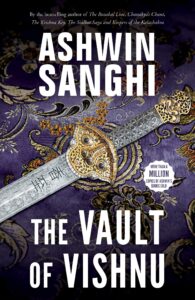
With Ashwin Sanghi, you are bound to find a reference to Dan Brown drawing comparisons between the two. It actually is not unwarranted. These are two authors with a stark similarity in their area of writing & the subjects they spin their tales around. Dealing with some hidden ancient secrets, combining historical facts with myth, they share a common ground with enough space for each other. When you read one, you almost have a sense of Déjà vu and are naturally reminded of the other. While for Dan Brown it is an old brotherhood, for Sanghi it is the ancient rulers & dynasties; for Brown it is ‘The Holy Grail’, for Sanghi it is ‘The Vault of Vishnu’. And both make for fascinating reads all the same.
Ashwin Sanghi’s ‘The Vault Of Vishnu’ is an enjoyable mix of history, bio engineering, myth, thrill, suspense & drama. The basic plot of the book revolves around an attack by the Chinese on the Indo-Bhutanese soldiers stationed at Doklam on the China-Bhutan border. What was mystifying was the strength & agility of these men, who looked more like apes – swinging across cliffs using thin ropes, effortlessly. The remainder of the book is roller coaster of a ride that seeks to decipher who or what these men are, what is the secret behind their unnatural power. As it sets out to do so, it takes you on a delightful journey uncovering some old lost secrets, some ancient cryptic texts and loads of historical facts & myths. There is much excitement of the unravelling of a mystery, decoding of a code or deciphering of a cryptic message, and finally, the thrill of all the pieces falling together to complete the jigsaw.
While it is an interesting plot that makes for a pleasurable read, the book however has it’s flaws. To start with, this is not an “easy” read. It is not one of those light hearted books you just read through effortlessly. This book is sure to give your mind a good work out & keep it ticking. The book actually tends to crumble under it’s own weight. There is too much information, I’d rather call it ‘data’, much of it avoidable. Honestly, I am flabbergasted by the author’s knowledge, especially in the history of China, and the meticulous research that has gone into writing this book. But I feel one needs to strike a balance between what you know, and how much is required to be shared.
There are two parallel stories running, one with the actual plot, and the other tracing the journey of an ancient Chinese monk Xuanzang – which appears as italicized chapters in the book. I realized late into the book that one could easily skip these parts as they do not add anything to the main story – maybe just read the first couple & last of these italicized chapters. There actually are 3 monks that are mentioned in the story – Faxian, Bodhidharma & Xuanzang, which the main plot references from time to time. I fail to comprehend the relevance of tracing the journey of one of them throughout the book, that too in such detail. The part of it necessary to the story is already there in the story itself. These chapters only serve to break the flow of the story, which in itself is loaded with too many characters, too many names, too many departments & places to remember. The author looses you at least a couple of times in the story for sure, and you will find yourself turning back pages to link things. There was a line in the book towards the end that says “Pam struggled to absorb all the information now swimming inside her head” – precisely the same with the reader!
Having said that, all detail is not bad though. The author touches upon so many interesting facts about our own culture, right from the ancient martial art forms of silambam and kalaripayattu to a small chapter primarily just talking about idli sambhar. The best thing with Indian authors is that you get to hear all these Indian names of people, places, dishes – the mention of which fills you with a pride and also joy. The mention of places like sadar bazar and Janpath make you say, Oh I’ve been here! To read of parathas and tea as opposed to bagels is a refreshing change sure thing.
While this book by Ashwin Sanghi may not be a laugh riot (and it isn’t!), it still has it’s share of some very funny situations and lines interspersed. A killer using a bitch to attract away the victim’s Rottweiler to have any easy kill – and the author describing it as ‘Love conquers all’; or referring to India as a fly that makes one’s food less enjoyable in context of China – are some such instances.
To sum it up, the key to enjoying this book is to not get lost in the rush of names, places & details and just go along the story not trying to remember each and every detail. It is ok to look back – which I think will be needed more than once. Enjoy the surprises unfurling and all the small sub-stories finally coming together for the upshot.
Historical Fiction is one of my favorite genres, and some books I enjoyed are The Last Bookshop In London (Madeline Martin) and The Lost Apothecary (Sarah Penner)

Pingback: Rashtrakutas: Lords Of The Deccan | Part 2 - BookForums | The Book Blog
Pingback: The Magicians Of Mazda: Bharat Series Continues To Intrigue - BookForums | The Book Blog
Pingback: The Lost Apothecary | BookForums | The Book Blog
Pingback: The Last Bookshop In London (Madeline Martin) | Book Review | BookForums | The Book Blog